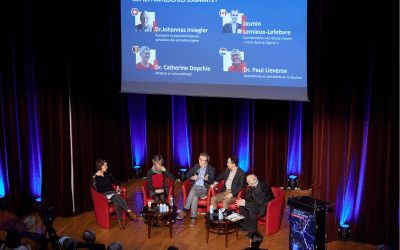On September 15, 2015, the Criminal Court in Rennes condemned Mrs. Laurence Nait Kaoudjt to a five-year suspended prison sentence, for having killed her eight-year-old daughter, Melanie, in 2010, who was severely handicapped since birth.
This case has once again highlighted the situation of people who care for severely ill or handicapped persons on a daily basis, who are often very dedicated, but progressively and dramatically may end up feeling alone and completely burnt-out.
This 49 year-old single mother, who raised her child alone since birth, expressed during the trial, how her relationship with her daughter was life-consuming: “Handicap it is 7 days a week. We slept together because I was afraid she might fall. (…) That was our life, always one with the other, fused together”. Thus, she continues to affirm having tempted to commit suicide without success, at different occasions on the night of the act. And her lawyer, pleading for her acquittal, underlines an expert’s comments: “They were as one person, fused together, one skin for both of them…”
She also explained her misgivings with institutions and her conviction that no one else could care for her child: “For me, it was very complicated to leave my daughter with an outsider; I had the impression of abandoning her, simply because she is without defense.” Just when her daughter was going to be admitted in a medically educational institute, wasn’t this perspective of seeing her leave, felt as a separation leading to death ?
Several witnesses have underlined her suspicion, her anxiety, “her great suffering” before a hopeless situation of a disability without a successful outcome. The experts described her state of “physical and psychological exhaustion”: that state which moved her towards an “altruistic suicide” motivated by the “despair to the point of giving up her own life, and killing her own child that she loved”. Her lawyer thus resumed the dramatic case: “This is a crime and an act of love at the same time; it is simultaneously terrifying and sublime”.
The Attorney General (representing the society, during a criminal trial) asked the jury to show proof of “empathy” faced with the suffering of this mother who had attempted suicide, but to also show proof of “reason” since it also concerns a murder. He explains why it is important to declare guilt symbolically: “No one is the owner of his child. Even if that child is handicapped, he is autonomous; he is entitled to his own life, his own humanity. If you declare today that she is not guilty, you deny that humanity. To give a common reference point to society, we always have the choice not to strangle a little girl.”
For Alliance VITA this case highlights once again, the painful situation of people who accompany disabled or severely ill persons on a daily basis, often being very dedicated but who ultimately end up feeling dramatically alone and burnt-out. A symbolic sentence is necessary to prove that one cannot kill for love; that every human being’s life is precious and is to be respected, even if it is frail or very fragile. At the same time, the suspended prison sentence can be interpreted as the will to take into account the atrocious confusion and the mothers’ hopelessness resulting from exhaustion and isolation.
Note: On the same day that the trial was being held, the deputies examined a second hearing on the bill on society’s adjustment to the ageing population. This text contains a symbolic measure concerning “caregivers” who take care of a loved one elderly person, dependent or handicapped: the recognition of a “right to relief”, by the grant of 80 million € to finance one week’s care for a dependent person in order that their family caregiver can rest. This possibility to recuperate, allowing the person to step back and to be assisted by others, wouldn’t this have been a necessary for Méline’s mother?



